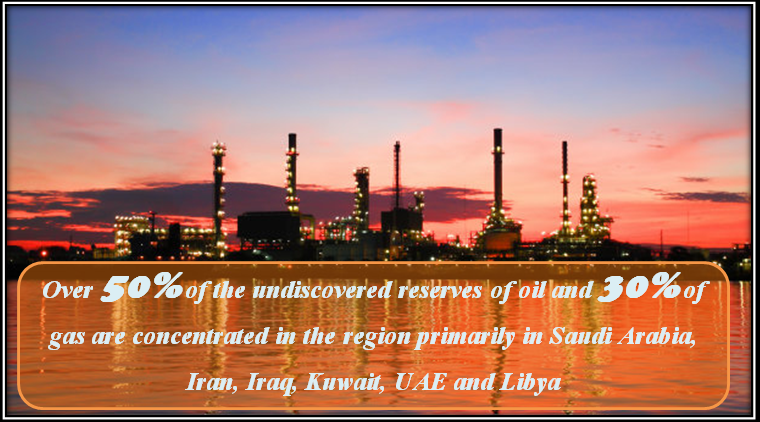Today, oil supplies about 40% of the world’s energy and 95% of its transportation energy. As a result, those who own the lion share of the reserves of this precious energy source are at the driver’s seat of the world economy and their influence is steadily growing. Since the 1930s the Middle East has emerged as the world’s most important source of energy and the key to the stability of global economy. It is home to 65% of global oil proven reserves and 45% of its natural gas. According to the US Geological Survey over 50% of the undiscovered reserves of oil and 30% of gas are concentrated in the region primarily in Saudi Arabia, Iran, Iraq, Kuwait, UAE and Libya.

The concentration of so much of the world’s hydrocarbons in this geographical location means that as long as the modern economy depends on the supply of oil & natural gas, the Middle East will play a key role in global politics and economy. As it is, most of the world’s countries are heavily dependent on Gulf oil. In 2006, the Middle East supplied 22% of US imports, 36% of OECD Europe’s, 40% of China’s, 60% of India’s and 80% of Japan’s and South Korea’s. Barring a major technological transformation, global dependency on the Middle East is only going to grow. Transportation will be the fastest growing oil-consuming sector. By 2030, the number of cars will increase to well over 1.25 billion from approximately 700 million today. Therefore, there are problems that have no solution in sight and that will no doubt directly affect the supply of energy from the Middle East: increasing terrorist activity against oil facilities, protectionism, lack of investment, unresolved border disputes and the growing uncertainty about the political stability of key energy producers like Iraq, Libya, Lebanon, etc.

These problems may impact to:
The war on radical Islam: Despite promises by the Middle Eastern governments to stop terrorist financing, 6 years after September 11, wealth generated by the region’s oil rich countries continues to flow to terrorist organizations and organizations promoting radical Islam. Furthermore, continuous infusion of money to radical Islamic educational institutions creates a new generation of radicalized youth, making reconciliation between the West and the Muslim world more difficult to achieve. This vicious cycle can only be broken through massive political reforms that the oil regimes currently seem to resist.
Regional stability: Despite the high visibility of the Arab-Israel conflict, historically, wars among Muslim countries in the Middle East have caused far bigger losses in terms of both blood and treasure. Such conflicts have been a destabilizing factor for the global energy market. Increasing sectarian violence and inability to reach an acceptable wealth sharing compromise is taking a heavy toll on the Iraqi oil industry with profound implications for the global oil market.
Global security: As nations become increasingly dependent on oil, it becomes strategically imperative for them to secure their access to the Middle East. This means building strong alliances with the region’s suppliers, providing them with diplomatic support and military aid and often turning a blind eye to their human rights transgressions.
Global economy: The recent change of the trade patterns of the Arab oil producers could potentially bring about the decline of the US dollar as the main reserve currency, a process that may already be on its way. At a time when the US dollar is weak and US national debt is at a historical high the specter of OPEC countries oil dropping the dollar in favor of other currencies while being a boon to Europeans, is a great threat to the US economy.
Since oil is a fungible commodity which is traded in the global market, diversifying away from the Middle East to other suppliers would be, at best, a stop gap solution. As long as the world’s transportation system depends on oil to the degree that it does today, dependence on the Middle East will grow and so will the economic and security burden associated with such dependency. The key should be to reduce demand for oil period and since two thirds of the world’s oil is used for transportation this means reducing oil use through increased fuel efficiency and through a shift from a petroleum dependent transportation system to one. The challenge ahead is how to reconcile environmental and security considerations.
Source: http://vnmanpower.com/en/services-categories/oil-and-gas-manpower.html

